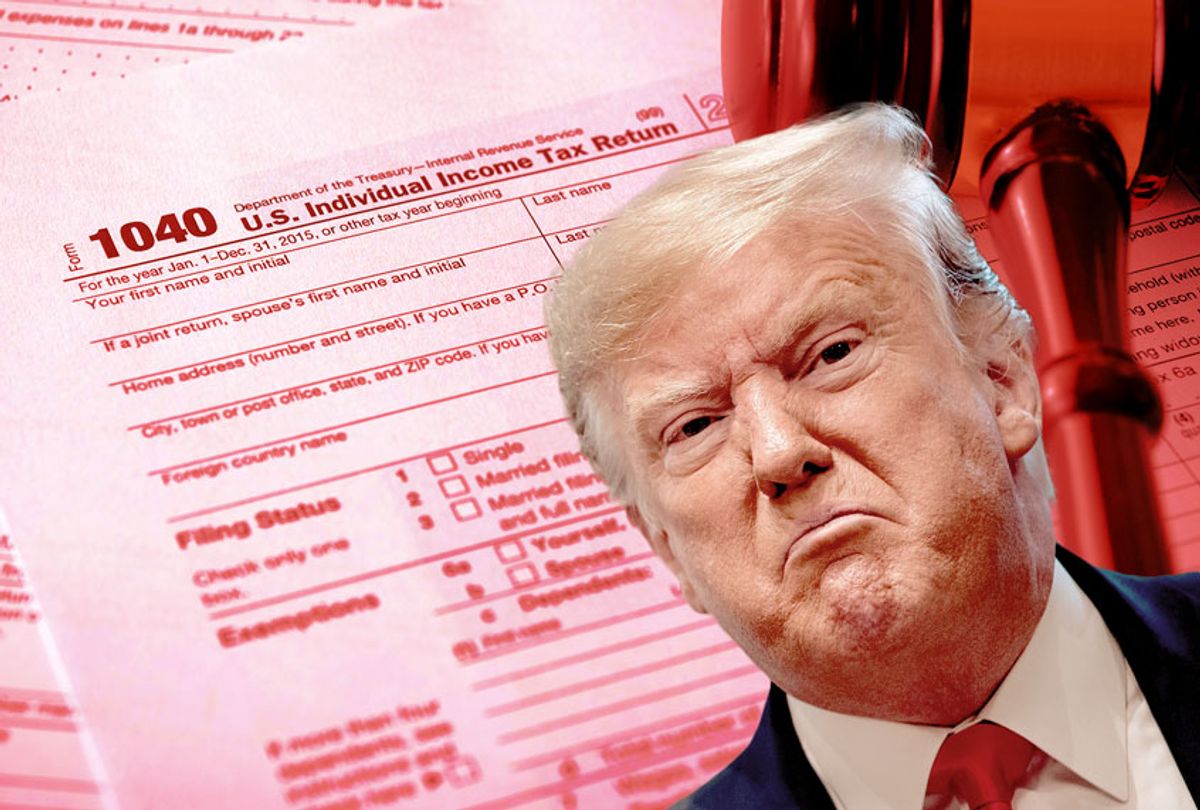A federal judge on Monday tossed out President Donald Trump's lawsuit seeking to prevent the House Ways and Means Committee from using a recently-passed New York law to provide the panel with an avenue to obtain his state tax returns.
Judge Carl Nichols of the U.S. District Court for the District of Columbia ruled that his court does not have jurisdiction over the New York officials named in the lawsuit, leaving open the possibility that Trump could file a similar lawsuit with another court, such as in New York state.
"Based on the current allegations, Mr. Trump has not met his burden of establishing personal jurisdiction over either of the New York defendants," Nichols, a Trump appointee, wrote in his opinion. "Mr. Trump may press his claims against the New York defendants in this court should future events support the exercise of personal jurisdiction over them, or he may opt to pursue those claims in an appropriate forum."
In this case, Trump had sued New York state to preemptively block the House Ways and Means Committee from requesting the returns under a new New York state law called the TRUST Act. The House Ways and Means Committee, chaired by Rep. Richard Neal, D-Mass., has not requested Trump's state returns through the state law.
Nichols is still considering whether Trump can sue the House Ways and Means Committee to stop it from requesting his returns under the state law.
The New York state attorney general's office argued that the case "plainly belongs in a New York court." Trump, meanwhile, had argued that the D.C. federal court was the right venue in which to sue, because New York state would send his financial information to Washington if Congress requested them.
New York State Attorney General Letitia James, one of the defendants named in the lawsuit, said in a tweet Monday that New York's tax return law "is an important tool that will ensure accountability & transparency."
"We are pleased with the court's conclusion," she said in a statement. "We have never doubted that this law was legal, which is why we vigorously defended it from the start and will continue to do so."
Democratic New York State Assemblyman David Buchwald, one of the authors of the legislation, praised the ruling, saying it "moves us closer to finding what it is he has fought so hard to hide from the public."
"Now I hope the courts move quickly to dismiss the other claims in Mr. Trump's lawsuit against the House Ways and Means Committee," the legislator added. "New York State will stand ready to provide the committee with the President’s New York State tax returns."
Trump's personal attorney Jay Sekulow said the president's legal team was "reviewing the opinion."
"The case against the Ways and Means Committee proceeds in federal court," he said in a statement.
The New York law was signed in July and allows the chairmen of three congressional tax-writing committees — the House Ways and Means Committee, the Senate Finance Committee and the Joint Committee on Taxation — to request the state returns of public officials from the state's department of taxation and finance.
Neal's committee is tied up in separate legislation over Trump's tax returns with the Treasury Department, which has refused to provide Trump's federal returns to the panel.
Neal sued the Internal Revenue Service (IRS) and the Treasury Department over the returns citing a section of tax law which state that IRS "shall furnish" the returns of any taxpayer to the chairmen of the three tax-writing congressional committees for a legitimate legislative purpose.
Neal has argued that he needs access to Trump's tax returns in order to make legislative changes if the presidential tax audit program, conducted by the IRS, is not working properly. The Treasury Department and Republicans in Congress have argued that the request represents a political stunt.
Trump is engaged in several legal battles across the country in an effort to keep his tax returns private.
A federal appeals court ruled last week in a separate case that Trump's returns must be turned over to Manhattan District Attorney Cyrus Vance Jr., who had subpoenaed the president's accounting firm for his financial records as part of an investigation into hush-money payoffs made to two women who alleged affairs with Trump ahead of the 2016 election. Trump's lawyers plan to appeal that decision to the Supreme Court.
The D.C. Circuit Court of Appeals ruled earlier this month against the president and refused to block a subpoena for his financial records from his accounting firm, Mazars USA, issued in April by the House Oversight Committee. Trump's attorneys could ask the full bench on the D.C. Circuit to rehear that appeal, or it could ask the Supreme Court to take up the case.
Another Second Circuit panel is considering a case brought by Trump, which challenges subpoenas issued by the House Intelligence and House Financial Services Committees seeking his financial documents from Capital One and Deutsche Bank. The banks have said they do not have Trump's personal tax returns, but Deutsche Bank indicated that it possessed the tax returns of at least two individuals or businesses requested by lawmakers.
Democrats on Capitol Hill have been on a quest to obtain Trump's tax returns after the president bucked decades of tradition when he first refused to release them during the 2016 election cycle.
Though not required by law, every major party presidential nominee since the 1970s has chosen to publicly release his or her tax returns except for Gerald Ford, who only released a summary. Financial disclosures can help paint a fuller picture of a candidate's business positions and interests by providing information about financial dealings, such as investments, donations, business relationships, assets and possible conflicts of interests.
Since clinching the presidency, Trump has argued that he cannot disclose his returns, because he is being audited by the IRS — even though an audit does not prevent a taxpayer from releasing his or her own tax documents.



Shares